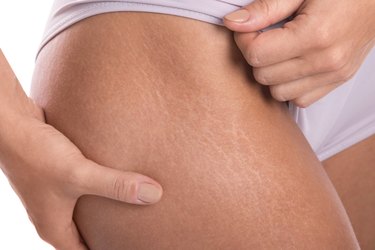
If you've gained weight, you may notice reddish or purplish stripes or streaks on your body, like your belly or thighs. You may know them as stretch marks. They won't disappear, but here's what you can do to make them fade.
What Causes Stretch Marks
Video of the Day
Not everyone who gains weight gets stretch marks. Doctors refer to them as striae, according to the Mayo Clinic. And per the American Academy of Dermatology (AAD), you are more susceptible to stretch marks if:
Video of the Day
- You have growth spurts in puberty
- You're pregnant
- You gain weight rapidly
- You weight train during periods of rapid muscle growth
Weight gain can cause stretch marks because weight gain stretches your skin, which breaks connective tissue, says Tanya Nino, MD, a board-certified dermatologist with St. Joseph Hospital in Orange County, California. "Specifically, the collagen and elastin in our skin becomes fragmented and thinner in the area of stretching. This stretching of the connective tissue leads to depressed lines in the areas of dermal damage."
What Makes Them Go Away
Will losing weight make your stretch marks disappear? They should fade or become less noticeable once you lose the weight, says Manish H. Shah, MD, a board-certified plastic surgeon in Denver, Colorado. However, this takes time. Stretch marks won't disappear from weight loss overnight, he cautions.
Also, if your stretch marks are too deep or quite pronounced, they may never go away on their own, Dr. Shah says. And, "unfortunately, there is no treatment available to make all your stretch marks disappear completely," Dr. Nino says.
However, there are ways to make them less noticeable, per the Cleveland Clinic. Among them are:
- Surgical methods: Depending on your age, skin tone and diet, you may have some success with surgical procedures such as dermabrasion, chemical peel, laser therapy, radiofrequency or ultrasound. Keep in mind these are considered cosmetic procedures and not likely to be covered by your health insurance.
- Medications: Applying hyaluronic acid and tretinoin, also known as all-trans retinoic acid (ATRA), to stretch marks when they first appear may make them less noticeable.
- Lotions and creams: A number of over-the-counter creams and lotions may help if applied before your skin stretches. If you're pregnant, talk to your doctor about their safety. Lotions and gels won't help old stretch marks, according to the AAD. Exfoliating with a gentle body scrub can help smooth the skin to address lighter marks, Dr. Shah says.
- Avoiding tanning: Some people think tanning improves the appearance of stretch marks, but it can actually make them more noticeable because stretch marks are made of scar tissue that does not respond to tanning, Dr. Shah says. "The result is that as the areas surrounding the scars darken, the stretch marks themselves become bolder," he says.
Stretch Marks: Cause for Concern?
Stretch marks may make you self-conscious, "but it is important to note that stretch marks do not bring about any significant or long-term health risks," Dr. Shah says.
On rare occasions, stretch marks can be a symptom of a more serious underlying health condition, such as Cushing syndrome or Ehlers-Danlos syndrome, according to the University of Florida Health. Cushing syndrome is a condition where the body has a high level of the hormone cortisol. Ehlers-Danlos syndrome is a disorder that involves having stretchy skin that bruises easily.
If you notice you're getting lots of stretch marks and can't figure out why, talk to your doctor.
- American Academy of Dermatology: “Stretch Marks: Why They Appear and How To Get Rid of Them”
- Mayo Clinic: “Stretch Marks”
- Tanya Nino, MD, board-certified dermatologist, St. Joseph Hospital, Orange County, California
- Cleveland Clinic: “Stretch Marks”
- Manish H. Shah, MD, board-certified plastic surgeon and anti-aging skin expert, Denver, Colorado
- University of Florida Health: “Stretch Marks”
Is this an emergency? If you are experiencing serious medical symptoms, please see the National Library of Medicine’s list of signs you need emergency medical attention or call 911.


